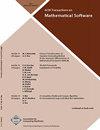算法xxx:在并行计算架构上计算显示秩的UTV分解的有效算法
IF 3.2
1区 数学
Q2 COMPUTER SCIENCE, SOFTWARE ENGINEERING
引用次数: 2
摘要
随机奇异值分解(RSVD)是目前公认的有效计算矩阵近似奇异值分解的技术。基于支持RSVD的思想,最近提出的算法“randUTV”计算给定矩阵的全因子分解,该矩阵提供具有接近最优误差的低秩近似。由于randUTV的大部分是根据矩阵矩阵乘法和非分解QR因子分解等通信高效运算进行的,因此在大多数高性能计算环境中,它比列轴QR等竞争性的秩揭示因子分解方法更快。在本文中,为共享内存和分布式内存计算环境提供了优化的randUTV实现。对于共享内存,randUTV根据块算法进行了重新设计,该算法与运行时任务调度器一起,消除了数据同步点的瓶颈,以实现比标准块算法更快的速度,基于纯粹的fork-join方法。分布式内存实现基于ScaLAPACK库。我们的新代码的性能与共享内存和分布式内存架构上的竞争因子分解相比是有利的。本文章由计算机程序翻译,如有差异,请以英文原文为准。
Algorithm xxx: Efficient algorithms for computing a rank-revealing UTV factorization on parallel computing architectures
The randomized singular value decomposition (RSVD) is by now a well established technique for efficiently computing an approximate singular value decomposition of a matrix. Building on the ideas that underpin the RSVD, the recently proposed algorithm “randUTV” computes a
full
factorization of a given matrix that provides low-rank approximations with near-optimal error. Because the bulk of
randUTV
is cast in terms of communication-efficient operations like matrix-matrix multiplication and unpivoted QR factorizations, it is faster than competing rank-revealing factorization methods like column-pivoted QR in most high performance computational settings. In this article, optimized
randUTV
implementations are presented for both shared-memory and distributed-memory computing environments. For shared memory,
randUTV
is redesigned in terms of an
algorithm-by-blocks
that, together with a runtime task scheduler, eliminates bottlenecks from data synchronization points to achieve acceleration over the standard
blocked algorithm
, based on a purely fork-join approach. The distributed-memory implementation is based on the ScaLAPACK library. The performances of our new codes compare favorably with competing factorizations available on both shared-memory and distributed-memory architectures.
求助全文
通过发布文献求助,成功后即可免费获取论文全文。
去求助
来源期刊

ACM Transactions on Mathematical Software
工程技术-计算机:软件工程
CiteScore
5.00
自引率
3.70%
发文量
50
审稿时长
>12 weeks
期刊介绍:
As a scientific journal, ACM Transactions on Mathematical Software (TOMS) documents the theoretical underpinnings of numeric, symbolic, algebraic, and geometric computing applications. It focuses on analysis and construction of algorithms and programs, and the interaction of programs and architecture. Algorithms documented in TOMS are available as the Collected Algorithms of the ACM at calgo.acm.org.
 求助内容:
求助内容: 应助结果提醒方式:
应助结果提醒方式:


